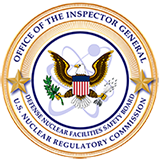ROCKVILLE, MD—For the first time in its history, the Office of the Inspector General participated in nuclear conferences and meetings at the international level.
May 15–19, Robert J. Feitel, Inspector General for the U.S. Nuclear Regulatory Commission and Defense Nuclear Facilities Safety Board traveled to Vienna, Austria, for the International Conference on Nuclear Decommissioning, hosted by the International Atomic Energy Agency. Accompanying him were Malion Bartley, Assistant Inspector General for Investigations, and Hruta Virkar, Assistant Inspector General for Audits.
Attendance at this invitation-only conference was limited to only a few from the agencies involved, which included the NRC and the U.S. Department of Energy. Since the OIG has determined that decommissioning is one of the NRC’s top management challenges and thus a major focus of its work, this conference was an opportunity for OIG senior management to engage with organizations internationally as they approach the subject.
The purpose of the event was to discuss achievements, challenges, and lessons learned in the decommissioning of nuclear facilities, highlighting current priority needs, and sharing information on strategies and approaches that enhance safe, secure, and cost-effective program implementation.
“Of course, the NRC presenters were particularly interesting and relevant to the OIG on the deactivation and decommissioning front,” Feitel said, “and their information provided a wealth of areas for Issue Area Monitoring, as well as possible future audits and/or investigations.”
NRC conference presenters discussed the agency’s technical guidance to implement regulations, including four NUREGs and four Regulatory Guides, and its plans to submit a final rule for Commission approval on decommissioning transition in 2024, a process that began in 2001. Feitel said, “It was also interesting to hear about the various U.S. reactor decommissioning business models, and how some IAEA member states were exploring the possibility of adopting the U.S. models, despite an overwhelming number of them still relying on their governments to shoulder the financial and logistical burdens of decommissioning.”
NRC presenters told attendees that the agency expects to terminate four power reactor licenses by 2025, and five more plants are expected to be in active decommissioning as their required 60-year license termination dates approach.
“I thought the presentations regarding the use of virtual reality and augmented reality visualization tools in decommissioning efforts were truly fascinating,” Feitel continued, explaining such tools, for example, allow workers to practice decommissioning activities in a virtual world first before going onsite, thus reducing employee risk of contamination, and greatly enhancing overall training opportunities for decommissioning workers.
While abroad, OIG senior staff also took the opportunity to meet with the IAEA Deputy Director General and Head of the Department of Management, who is the former NRC Executive Director of Operations, and the IAEA Director of the Office of Internal Oversight Services, who is Feitel’s counterpart at the IAEA.
These meetings come on the heels of an informative lunch meeting between OIG senior management and Nuclear Energy Agency Director-General William D. Magwood, IV this past March, during the NRC’s Regulatory Information Conference in Rockville, Maryland. The NEA recently published “Cost Benchmarking for Nuclear Power Plant Decommissioning,” which could also provide some valuable audit background and reference points.

